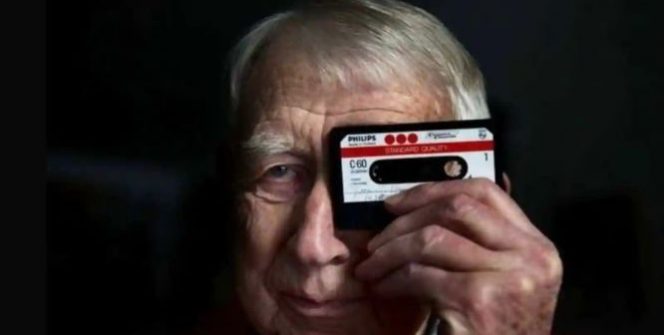Lou Ottens has lived a long life, and in the past, he has been an influence on how we listened to (and recorded) music.
Ottens was born on June 26, 1921, in Bellingwolde, the Netherlands. His teenage years were unfortunate (a certain second world war was happening…), but he quickly showcased his talent when he ended up building a radio for his parents so they can listen to Radio Oranje, a Dutch-language broadcast by the BBC. He also built an antenna on it to avoid Nazi jamming (as they have invaded the Netherlands; this is why he nicknamed the antenna the Germanenfilter).
Ottens studied engineering after WW2, and after receiving his degree, he began working at Philips in 1952. In eight years, he became the head of product development, and in a year, the first portable reel-to-reel tape recorder, the EL 3585, was created. However, Ottens was frustrated by this technology: „I got annoyed with the clunky, user-unfriendly reel-to-reel system, it’s that simple,” he said. His team began working on a new tape system with one goal: the new format has to be small enough to fit inside an inside jacket pocket.
In 1962, the cassette tape was invented (the Compact Cassette), and a year later, a Berlin electronics fair showcased it to the public with an advertising slogan that pointed out it was smaller than a pack of cigarettes. The technology quickly spread, and according to the BBC, over one hundred billion tapes were produced. On the technology’s 50th anniversary, Ottens told Time that it had been „a sensation” from day one. „Lou was an extraordinary man who loved technology, even as his inventions had humble beginnings,” Philips Museum Director Olga Coolen told NPR. What happened to the prototype cassette that was made of wood? According to Coolen, it „was lost when Lou used it to prop up his jack while changing a flat tire.” Philips and Ottens – to avoid Japan’s substandard copies – teamed with Sony to establish the Philips mechanism as the industry standard. In the 70s, Ottens was the director of audio of Philips’ NatLab, which was involved in the creation of the CD. Sony and Philips created the 12 cm CD as a standard, which quickly became a hit after it started in 1982-1983.
The cassettes were part of the gaming industry, too. The ZX Spectrum and the Commodore 64 both allowed us to use tapes to play games from them, although they were much slower than the floppy disks. Still, we can’t leave Ottens’ legacy uncommented, even though he admitted that „It still hurts that we didn’t have one” Walkman invented, as Sony took that away from them. He was modest about his achievements, too: „We were little boys who had fun playing. We didn’t feel like we were doing anything big. It was a kind of sport.”
Ottens passed away on March 6 2021 at home in the village of Duizel, in North Brabant. Rest in peace.
Source: PCGamer
















Leave a Reply